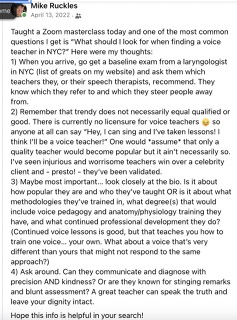You’ve heard me talk about how New York City diner menus. They overwhelm me. I mean, who can choose between blintzes and a BLT?
(I’m remembering a woman I waited on at Artie’s Delicatessen who ordered French toast and followed it up with a slice of carrot cake. She didn’t have any problems choosing.)
I finally developed a technique of deciding the category of food I’d order BEFORE walking into the diner, and that helped.
But I’ve found that my menu overwhelm syndrome creeps up in other areas of my life.
And I’ll tell you why.
We get NYC menu-level info hurled at us every day. That is, you do if you get as attached to that little computer rectangle in your pocket with the candy-colored squares on its adorable little screen as I do.
Lately it’s been the YouTubes.
I told you last week about how I’m all about that INPUT. (Did you do your Clifton Strengths? They’re helpful, right?)
Input’s a wonderful trait for an educator. And it’s a PARALYZING flaw when you’re just trying to put one foot in front of the other toward that thing you decided was a priority.
But you get surfing on one algorithm wave, and all of a sudden you’re like,
oooooh, wait, maybe I need to break this all down in an Asana work flow. Hmmmmm. Will the free version be okay? How much money have I spent on software this year? No. Just use your paper checklist that’s been working. Did I pull those tasks from my Google Calendar? What about the bullet journal? How do these people post on Instagram so much? SHOULD we buy land and building and off-grid community with rentable yurts and compost toilets?
?
Then Melissa’s like, “Sweetie, you need some time? What’s up?”
And I’m all like, “Where do I even BEGIN? It’s MADNESS in here, I tell you! It all started with blintzes.
Melissa threw me a life preserver, though. ? (She may have gently aimed it at my head.)
She brought my brain back to our lived-in kitchen and toy-strewn living room and reminded me, “The summer’s gonna be over soon. Let’s enjoy this time we have together.”
Thank you, sweetie. It was so clear and simple.
I’m having a hard time appreciating the present lately. My brain flies off in the future, and the future looks like a diner menu with much higher prices.
So, these are some things I’m doing to help my brain.
Feeling wonky? How can you get back to HERE?
You’re gonna roll your eyes, but the answer almost all the time is paying attention to your breath. And it’s paying attention to your breath longer than you want to. I want to take exactly one and a half deepish inhales and feel balanced again.
Nope. It takes a little longer to travel from Agitation Station to Clarity Town.
The other thing is to notice things around you on purpose. And name them to yourself. The wall color, the birds you may hear, the loud train or smell of subway track grease. This helps. (Also key in an audition room.)
This, too, takes longer than I want it.
Siri, “Make me present, calm, and serene!”
One other thing: Phone a friend. Literally pick up that rectangle computer and call somebody. This, for some reason, is hard to do these days. Especially because we all assume something’s wrong when we get an actual phone call. So, maybe send a prelim text.
This is also especially hard for folks like me who want to solve everything inside the ole brain. One day I’ll accept this doesn’t work.
One other simplifying question that’s helped me is from James Clear’s book Atomic Habits.
It’s a question of identity.
If you want your identity to be someone who’s healthy and vibrant, you can ask yourself, “What would a healthy and vibrant person do?”
I’d drink a glass of water. I’d get out for a walk. I’d take some time to stretch.
If you ask yourself what you’d like your identity to be, you can then ask, “What would this kind of person do?” We almost always know. It’s just that the steps are often so simple, our brain’s like, “It can’t be that straightforward. Yawn. What’s on YouTube?”
That brings me to the next helpful thing: Getting where you want to go means doing simple/boring things over and over.
It’s not shiny and entertaining. It’s satisfying.
Once you stop expecting constant amusement to be a thing, you can start humming and stretching and learning that song you picked out for the cabaret you decided to put together (even though you feel scared. I always do.)
Then when you show up for the thing, those days and days of practice are in your body. That’s where confidence comes from, the skill you built.
The other one that’s helpful and very hard for me is seasons.
Right now is the time for — fill in your blank.
Right now is not the time in my life when I can do a lot of 730pm dinner meetups. I’ve got to put my boys to sleep mid-chapter of the next Chronicles of Narnia book.
Let’s review:
? Breathe for as long as it takes.
?? Notice things around you for as long as it takes.
? Connect in a real time present way with somebody you trust.
? Ask yourself, “What would a kind-of-person-I-want-to-be do?”
?? Then do it. Over and over, and look for the satisfaction not the entertainment.
? And notice what season you’re in.
Hope this was helpful for you. I’ll keep you posted.
In the meantime, you know what I’m fixing to say: There’s only one you, and folks need to hear the story only you can sing.
Love much,
Dan






